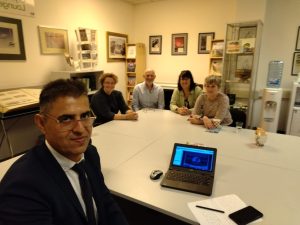BP Archive: A Source for the Study of the Contemporary Economic, Social and Cultural History of Kirkuk
By Zainab, on 5 December 2022
We talk to Dr Dilshad Oumar Abdul Aziz, Head of the History Department at the University of Kirkuk. Throughout September and October 2022, he held a Nahrein – BISI Visiting Scholarship at the BP Archive and History Department, University of Warwick. We talk to him about his experience as a Visiting Scholar here in the UK.
What were the main benefits of your scholarship?
During my stay at the BP Archive at the University of Warwick, we scanned and documented files previously reserved through the archive’s electronic database of 6000 – 7000 documents. These files included historical papers of Iraq’s economic, social and cultural history.
I also designed and wrote A Guideline for Researchers & Students to Contact the BP Archive, in three languages: English, Arabic and Kurdish. The purpose of this guideline is to show the significance of the BP Archive and the important documents it contains for the economic and social history of the countries of Iraq, Syria, Lebanon and the Gulf. The guideline also familiarizes researchers with the history of these countries and how to benefit and use the BP Archive documents in their research projects.

“My aim is to familiarize local researchers and postgraduate students in the field of modern and contemporary history in Iraqi universities about the importance of the BP Archive”
What was the main highlight of your scholarship?
I organized a webinar via Zoom on September 28, attended by more than 150 researchers and postgraduate students from Iraqi universities. During the workshop, the guideline was launched, and the attendees were introduced to how to use the archive’s electronic database. You watch the recording of the workshop on the Nahrein Network’s YouTube channel.
My project has also captured the interest of several news outlets in the region. I conducted a 15-minute television interview with the Kurdsat News TV. We talked about the importance of my project, outputs, and support of Nahrein Network and BISI. I also talked about experiences gained from the visit, and how to transfer them to the academic reality at the University Kirkuk and other universities in Iraq. You can see the interview on Facebook (in Kurdish).
What will you do to continue your research in Iraq?
Since returning from the UK, I have been writing an academic research paper titled, “The Iraq Petroleum Company Archive: a source for study the economic, social, and cultural history of Kirkuk.” I am currently in the final stages of my research and I hope to publish the paper in both Arabic and English. Another output of our project is to prepare an index for all the scanned documents relating to Kirkuk’s economic, social and cultural history in the BP archive.
I aim to disseminate the knowledge gained from my scholarship with the BP Archive at the University of Warwick after returning by establishing of a series of workshops tailored to researchers, professors, graduate students and employees of research centers and central libraries, especially at the University of Kirkuk and the Central Library in Kirkuk, raising awareness of the documents available in the archive and urging the community to communicate and to benefit from the material available in their future studies and research.


 Close
Close


